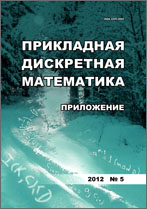|
Mathematical Methods of Cryptography
On mixing properties of modified multidimensional linear generators
I. I. Khairullin
National Engineering Physics Institute "MEPhI", Moscow
Abstract:
A new class of shift registers of length $n$ with $r$-bit cells, $n,r>1$, called modified multidimensional linear generators (MMLG) is described. An experimental study of the mixing properties of shift registers of length $8$ over $V_{32}$ from the MMLG class is carried out. The feedback function of these registers is based on the round transformation of the lightweight block cipher SPECK. For such MMLG with different sets of pickup points $D \subseteq \{0,\ldots, 7\}$, the local $(0,256)$-exponents of mixing matrices $M$ are calculated as
the smallest positive integer $\gamma$ such that, for any natural $t \ge \gamma$, all the columns of the matrix $M^t$ with numbers $1, \ldots, 32$ are positive. The $0$-indexes of perfection are calculated as the smallest values of the degrees of the register transformations, for which each coordinate functions of output cell essentially depends on all input variables. For MMLG with pickup points with numbers $0$ and $7$, the values of the local exponent and the local index of perfection are equal to $17$. The obtained values are compared with the local exponents and local indexes of perfection for structurally similar schemes based on modified additive generators (MAG). The comparison shows that the generators have similar mixing properties. However, unlike the considered class of shift registers based on MAG, the MMLG class is interesting for usage in conditions of limited resources.
Keywords:
modified multidimensional linear generator, mixing properties, matrix-graph approach, mixing matrix, index of perfection, shift register, exponent, SPECK.
Citation:
I. I. Khairullin, “On mixing properties of modified multidimensional linear generators”, Prikl. Diskr. Mat. Suppl., 2019, no. 12, 141–145
Linking options:
https://www.mathnet.ru/eng/pdma456 https://www.mathnet.ru/eng/pdma/y2019/i12/p141
|

| Statistics & downloads: |
| Abstract page: | 118 | | Full-text PDF : | 34 | | References: | 24 |
|




 Contact us:
Contact us: Terms of Use
Terms of Use
 Registration to the website
Registration to the website Logotypes
Logotypes








 Citation in format
Citation in format 